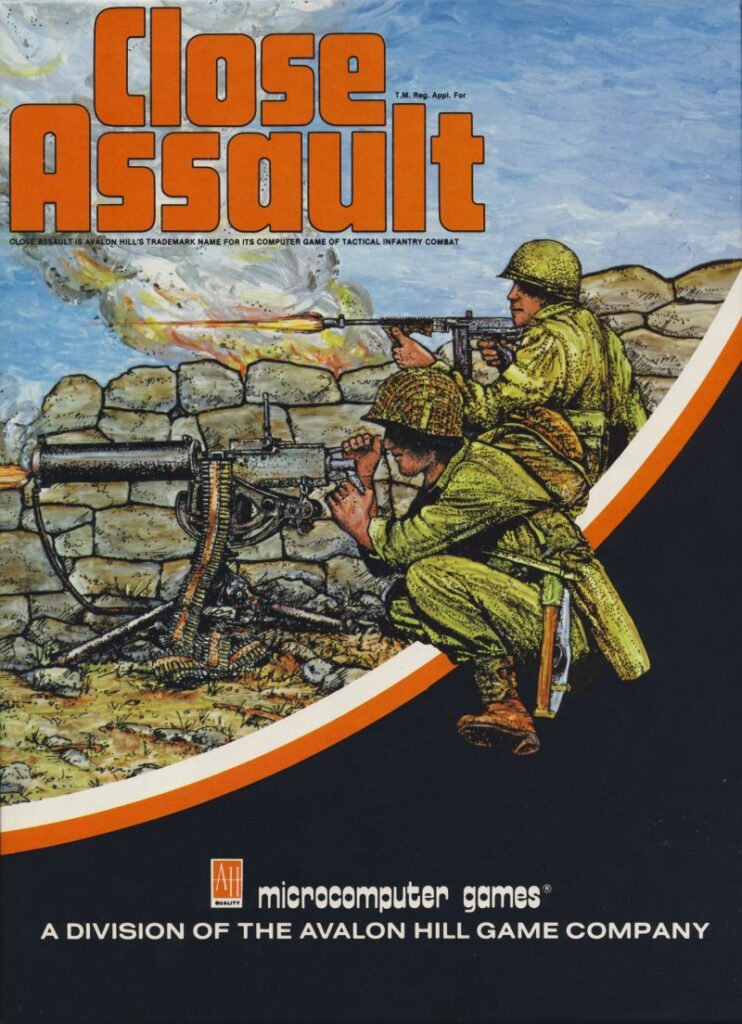
Do you think the players have all the information they need with the board, the counters and the screen?
I don’t think so. If only there was an easy way to show them which squads have leaders and heavy weapons! Alas, I don’t see any.
I have an idea. What if we provided the players with a squad record pad?
Typing commands on the keyboard, pushing counters on the board and taking notes on the pad. Oh my ! Genius ! It will be a holistic gaming experience. The players will LOVE it !
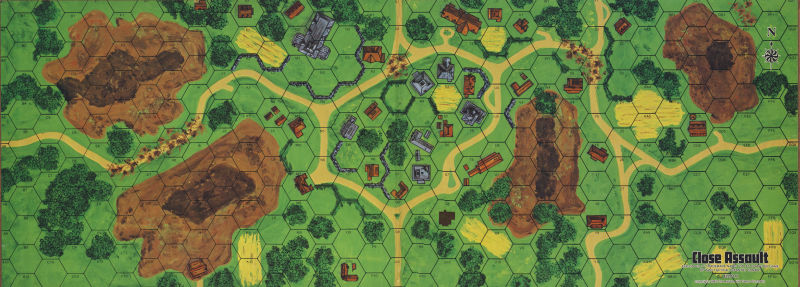
Close Assault was in early 1983 (if not late 1982, exact release date is unclear) one of the last Avalon Hill computer games which needed to be played with a board and counters (like Tanktics or Dniepr River Line). To my knowledge, outside of a company called Simulations Canada that would occupy the niche for a few more years, there would be only one more of those transitional “computer-assisted [war]games”, as they were called: Avalon’s Hill’s Frederiksburg , but Fredericksburg is a two-player game, and pretty much impossible to find anyway, so I am unlikely to cover it. [Edit 11/07/2022 : It turns out I was also missing SSI’s Fighter Command]
Close Assault offers 3 factions with their own strengths and weaknesses: the Americans, the Germans and the Soviets. The game lets you fight any other faction, so you can have your what-if with the Soviets and the Americans exchanging bullets. For the AAR, I decided to play the Germans in attack, against the AI Americans defending ; I believe it is the hardest combination possible with the human player as the attacker. According to the manual, this puts the village somewhere in the Ardennes, in 1944. I am sure taking this village will allow our wise commanders to push the Western Allies out back the sea somehow.
Both sides have 14 counters to fight with 3 statistics tracked for each of them (FIREPOWER-RANGE-MORALE).
The Germans have :
- 10 regular counters (4-6-7)
- 3 elite (“Assault”) counters (8-3-8) with smoke grenades
- 4 heavy weapon crew counters (2-4-7)
Meanwhile, the Americans are fielding :
- 10 regular counters (6-6-7)
- 3 elite (“Para”) counters (8-4-8)
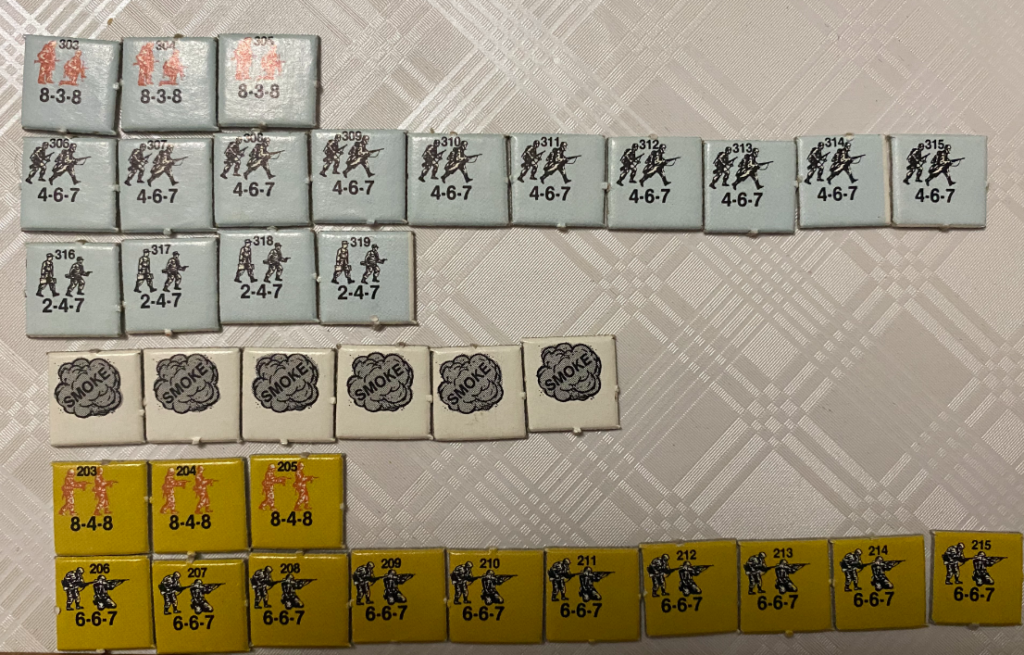
In Close Assault and uncharacteristically for a wargame, German soldiers are inferior to the Americans :
- the regular soldiers have less firepower, because a Karabiner 98k is no match for a M1 Garand,
- the elite troops have the same firepower, but the US troops have a longer range (though it is still not great), probably representing the advantage of the M1 Thompson compared to the MP40,
The US advantage is not compensated by any other factor like “morale” or “discipline”. Furthermore, the Americans have heavier machine guns on average, not necessarily a superior option when attacking as they hamper movement, but undoubtedly great in defence. In this battle, my advantages will be :
- that as the attacker I get to equip my elite forces with flamethrowers and demo charges,
- my 4 extra “heavy weapon crew” squads.
Note that all squads can carry machine guns, it just happens that those “heavy weapon crews” are useless without them so they will take the machine guns and let the rest of my grunts remain light on their feet.
As for my objective, the manual states :
For as long as men have fought wars, philosophers have debated the meaning of victory. Many generals have "won" on the field of battle, only to find that political conditions or excessive casualties rendered the victory meaningless. Close Assault by no means intends to provide a definitive philosophical answer ; it simply reports the immediate tactical victor of the battle. However, information on KIA, WIA and MIA men is provided so that players have something to discuss as they debate the large questions after the game.
Well, given I play the Germans in late 1944 I can already conclude that political – and military – conditions will render the victory meaningless in the best of cases, tragic otherwise, but thankfully the manual gives you something more specific one paragraph later. In a nutshell, I must have more men than the Americans in the objective area (basically the central village) after 10 turns. I can do that.
It is time to deploy my men. I have the village surrounded, but I decide to deploy most of my troops East of the village for various reasons, not all of them very good :
- I play the Germans against the Americans, of course I must arrive from the East,
- I played most of my earlier games as an attacker from the West and I want some changes,
- I feel there is slightly less open terrain to cross, and against US machine guns open terrain is going to be punishing.
I set up a few men in the West, in particular I want to deploy a heavy machine gun in a large two-storeys (grey) building which can overlook a large part of the village, plus another group in the South for a more dangerous mission. But the brunt of the assault will come from the East, and that’s where I deploy all my elite soldiers with their demo charges and flamethrowers and 3 of my 5 leaders (not showed by any counter).
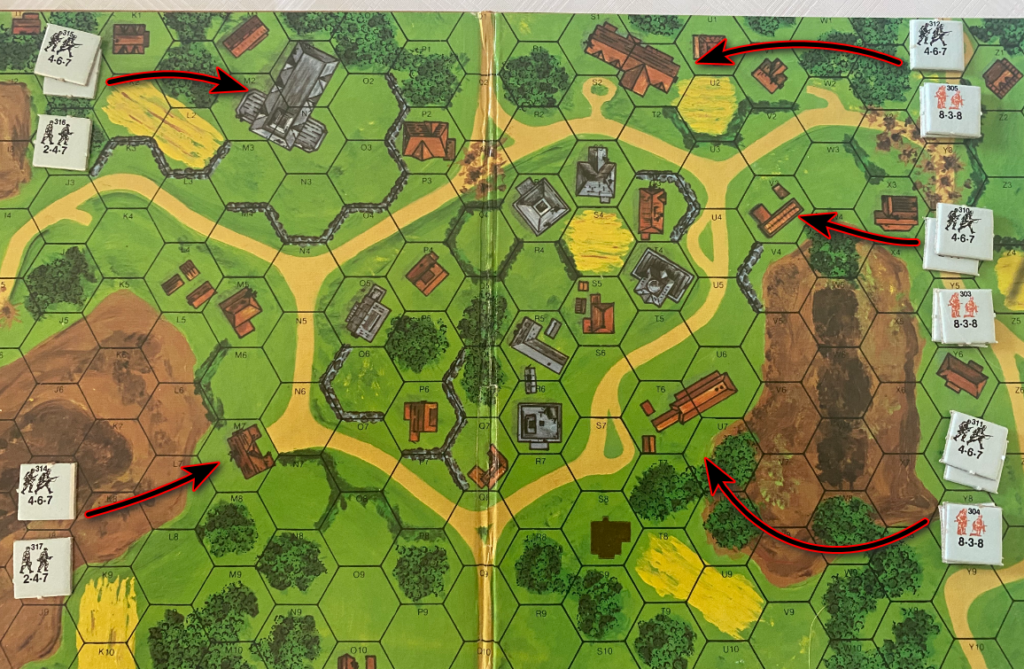
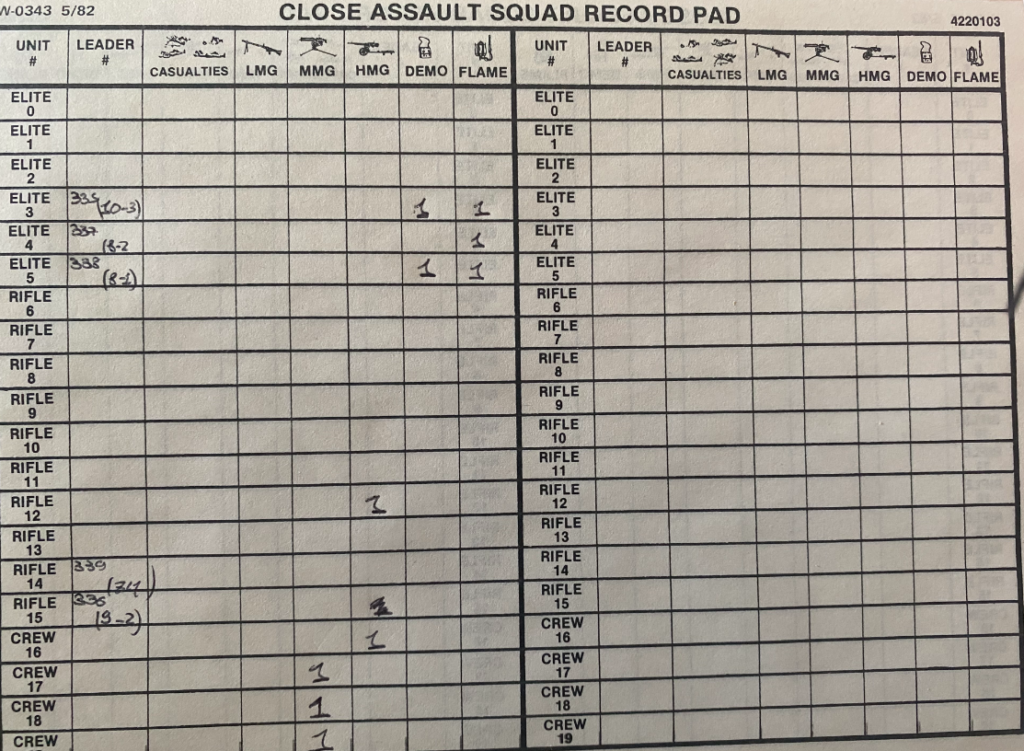
One of those leaders, allocated to team 303, requires special attention. It just happens to be me, personally. I would be very sad if anything happened to him, I mean me, and in game terms it would also give control of my side to the AI, a weird feature which must not have been very popular in multiplayer (“well, I killed you already turn #2. Let me finish this game against the AI then”).
Turn 1 : The sacrificial lambs
The action is sliced into a lot of subphases. Each turn has two “sequences”, in the first sequence the Germans are the “attackers”, in the second one they are the “defenders”. A typical sequence :
- Preparatory fire from the attacker
- First movement from the attacker for units which did not fire yet
- Defensive fire from the defender,
- Fire from the attacker, for those units which still have movement left (efficiency of the fire being proportional to the number of movement points left),
- A second movement for all (non-routed) attackers by exactly one hexagon (movement points are not taken into account for this one),
- Close combat, if any,
After that, the attacker/defender roles are swapped.
I have no target in sight, so no preparatory fire. I immediately move toward the target, with the unfortunate squad 309 given the task of “reconnaissance by being fired at” and ordered to climb on the top of a crest.
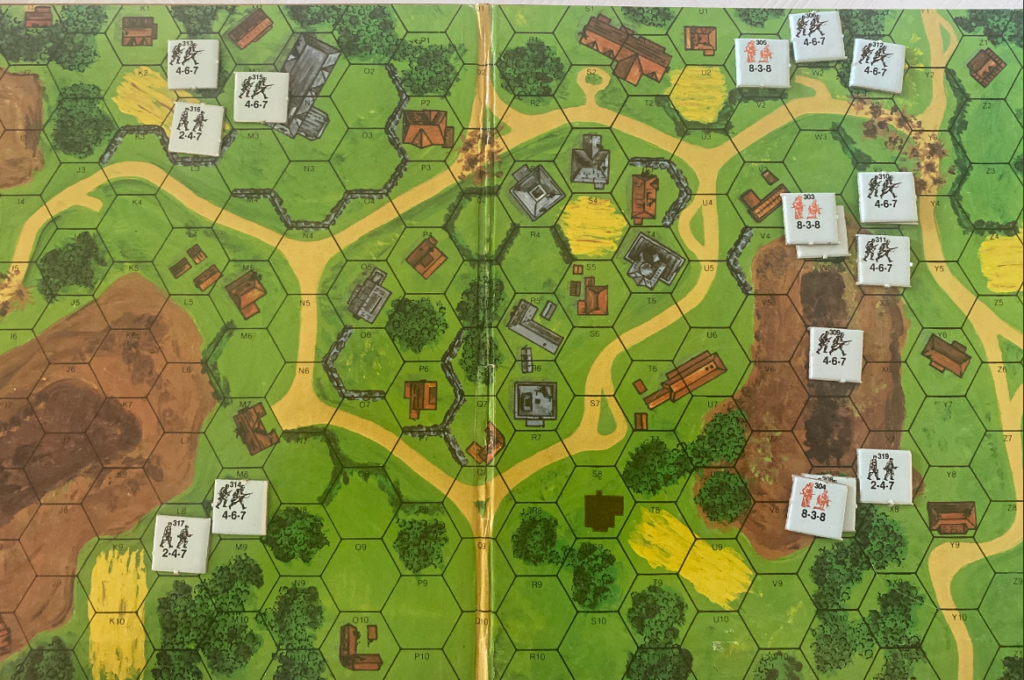
It pays off, except for squad 303 which loses 6 men out of 10, but worth it: I now have a very good picture of the American deployment. In the South-West, squad 314 is unexpectedly spotted and shot at, with 4 total losses :
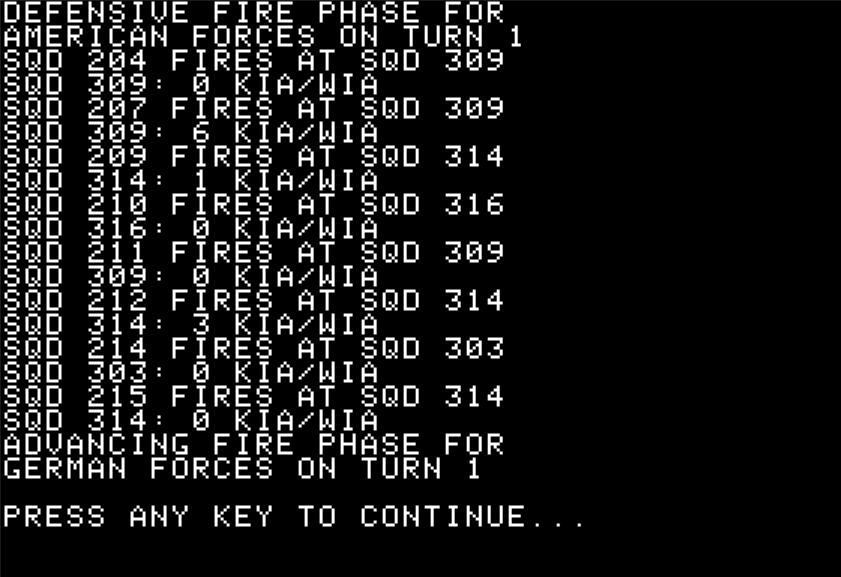
From the report of enemy positions I receive, I have now detected the 5 Heavy Machine Guns (HMG) the Americans are supposed to have, plus two of the Medium ones (MMG). I also identified the two groups I want to destroy fast (212 and 214) as they have a leader (LDR) and two machine-guns.

I return some fire ineffectively and use my extra movement to occupy a better position.
It is now the Americans’ turn to “attack”. They mostly hold position and shoot, killing one more hapless sod from team 309. Looking back, maybe moving them to the top of the hill was not the best idea, but what’s done is done.
Turn 2 – Smoke & Fire
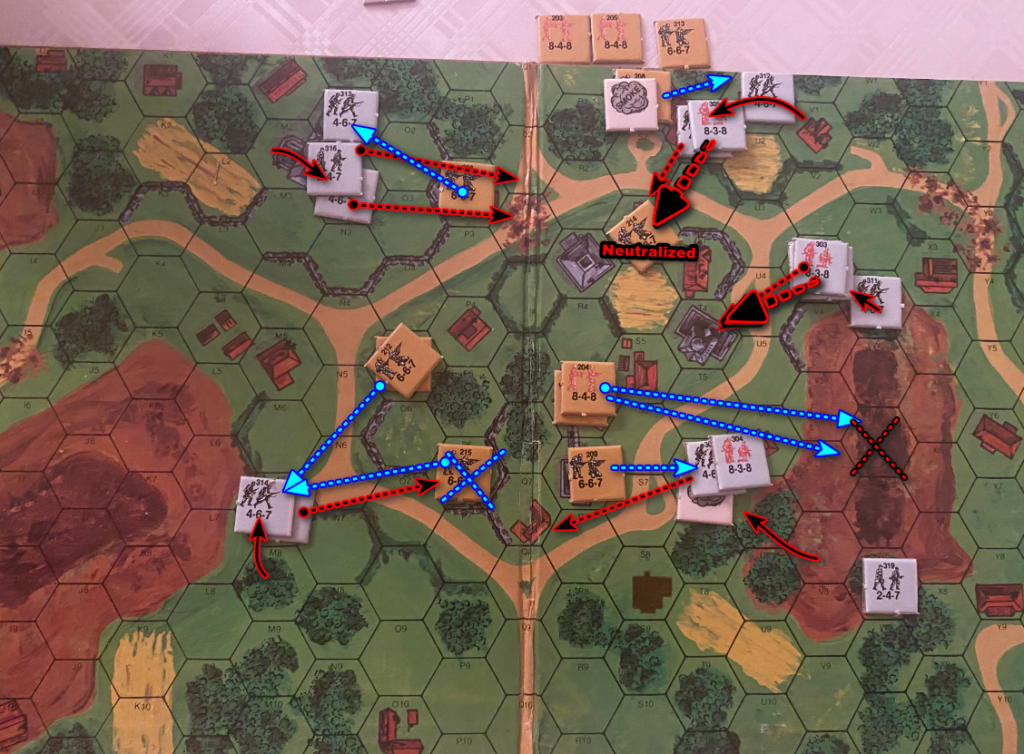
At the end of the previous turn, as part of their extra movement, some Americans had moved in range of the flamethrowers (2 hexagons) of the elite infantry I personally command, and they are immediately punished for that!

I also shoot with the squad accompanying my elite troops, and the result is very satisfying :
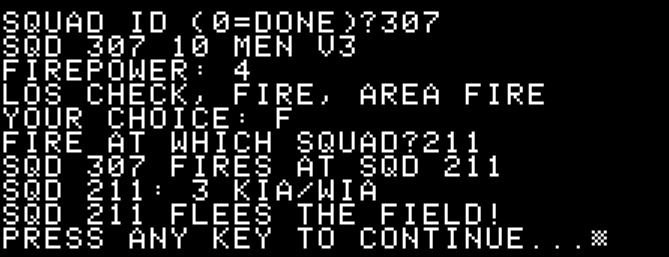
In the North, one of my elite squads uses its smoke grenades for cover as it occupies a building. My plan was to immediately attack the Americans I covered in smoke, but unfortunately my men were briefly disorganized (“broken” in game term) by the enemy defensive fire, even though they had received no losses, and by the time the leader put some order in the group the opportunity had passed.
Still, my bold advance in the North-East goes well despite this minor setback. The same cannot be said of my men in the North-West. One of my infantry squads in the top-left corner is racked by gunfire and halved in number, its leader killed. In the East, “scout” squad 309, pinned down and unable to move, is finished off.
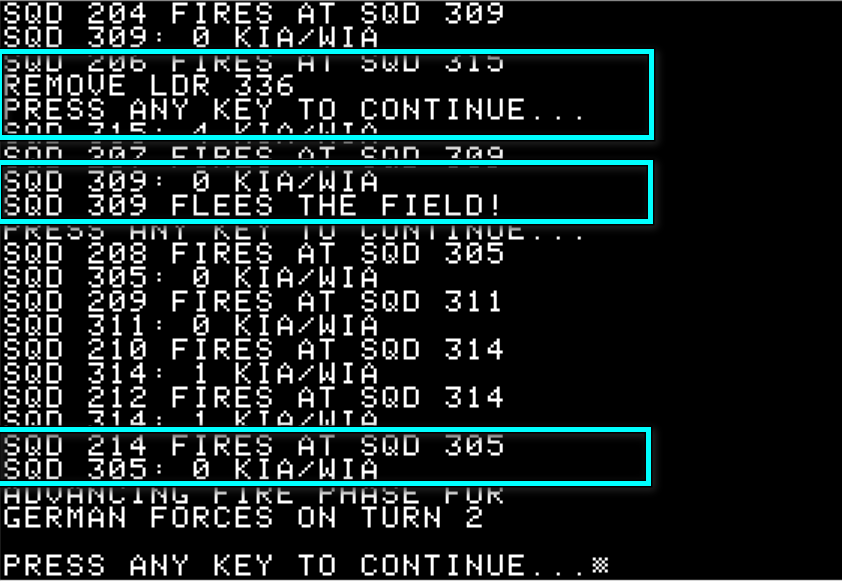
When it is my turn to fire again, my North-Eastern elite squad uses its flamethrower to wreck enemy group 214 that I had tagged as “high prio”: both its machine guns are destroyed and they lose 7 men out of 10. The large number of soldiers around me, leader 335, will now be able to infiltrate the center of the village.
Turn 3 – Entering the village
The top-right of the map is wide open, with only one US squad (208) still representing a threat. At contact, elite troops can use “demolition charges” against adjacent enemies entrenched in buildings. The demo charge is spent, but the enemy receives devastating damage. That’s exactly what I do, and while squad 208 survives it is probably broken and unable to resist any further.
After that, the large number of troops that were accompanying my personal squad cross the street and spread out. I deploy my last smoke grenade between me and the large group of enemies in the South-East, and I assault in melee the largely depleted and broken American squad North of the village, destroying them easily.
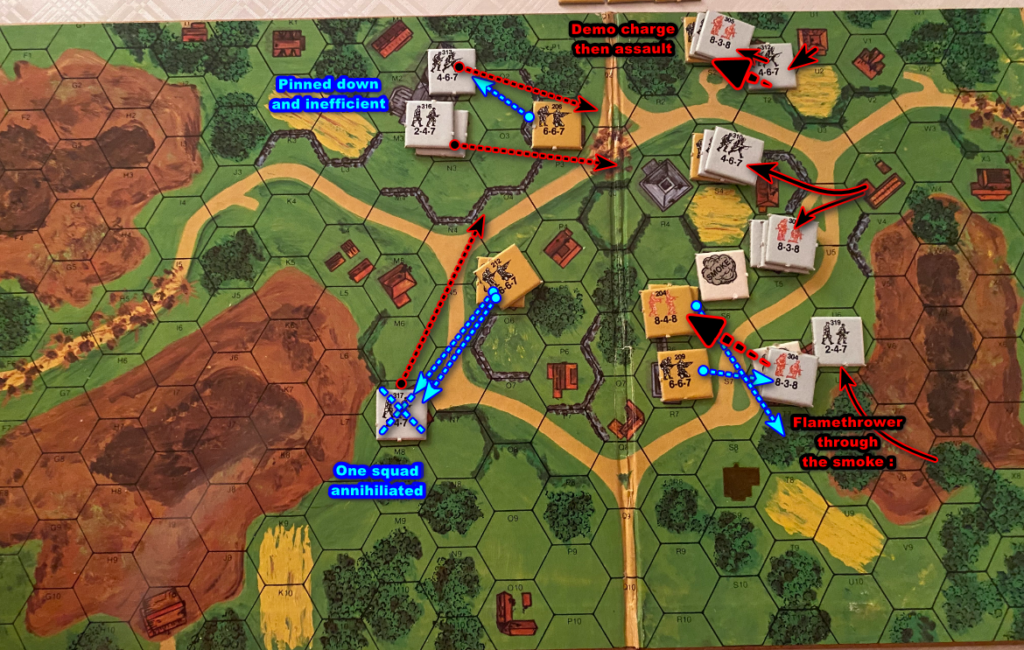
I also get lucky with another of my flamethrower attacks in the South – killing 3 men and destroying a medium machine gun), but much less so West of the village, where my men are pinned down and killed one after the other.

Turn 4 : Fire without smoke
The smoke I created abates just at the right moment to let me shoot at the various US squads in the South-West with flamethrowers, rifles and machine guns from two directions :
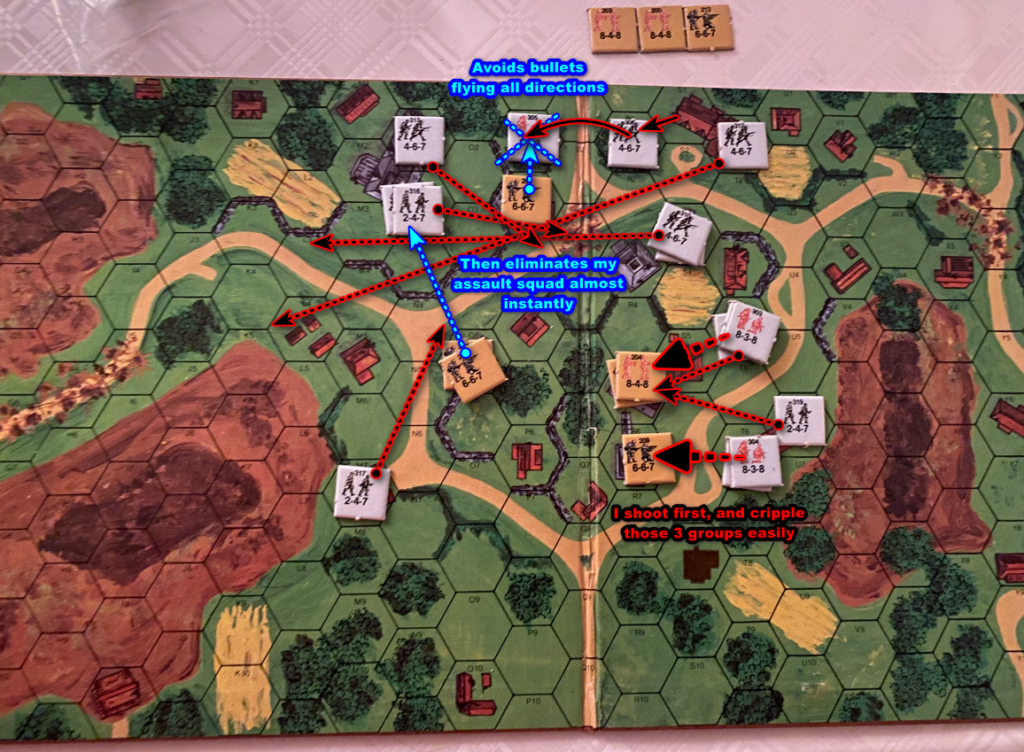
I cause devastating damage, the GIs are too shocked to retaliate, and my losses amount to a single flamethrower that breaks after serving its purpose.
On the other hand, the soldiers from the US squad East of the large building in the North manage to avoid all damage despite being fired at from all directions, and even eliminates one of my elite assault squad that approached a bit too much as it was expecting the Americans to be pinned down.
Turn 5 – US Counterattack
I use my last functional flamethrowers to mop up the survivors southeast of the village, then my men progress from building to building, finding the few remaining “undetected” American squads.
In the North-West, the US super-resilient squad finally loses a few men, but it still shoots with pinpoint accuracy at another of my squad, which is wrecked.
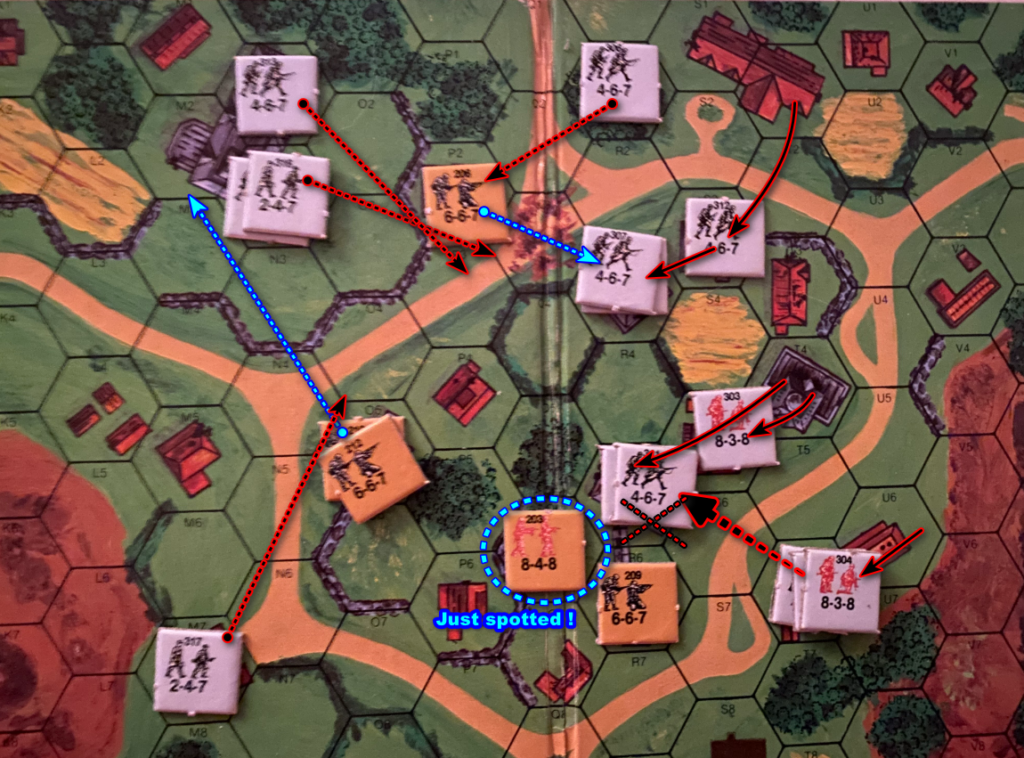
I see the entire village, but there are still two American squads unaccounted for. They suddenly appear South of my “safe” flamethrowing position, throw a smoke grenade that ruins my defensive fire and assault in melee! Similarly, the newly detected elite group in the middle of the village does the same.
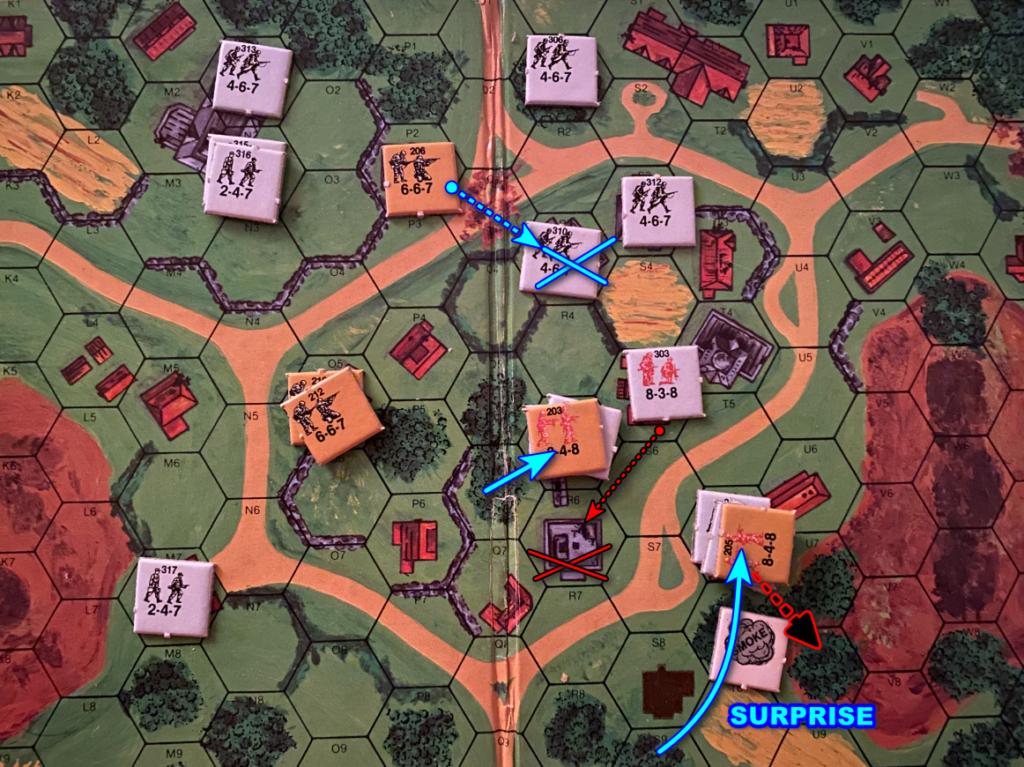
In Close Combat, only one side can survive a melee – the other side will be fully destroyed. The Americans lose 2 counters, and I lose 4 of mine. This assault cleaned up a good 20% of the counters on the board.
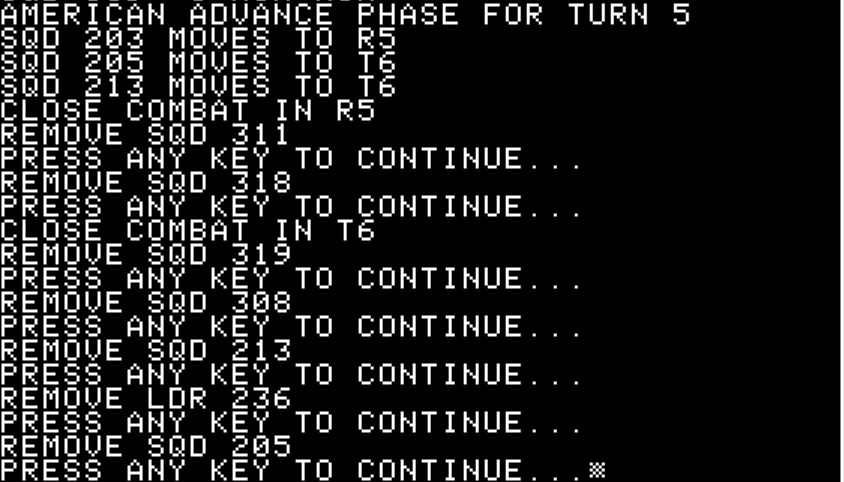
The end result is that I still hold the building in the South-East, but barely – the squad that emerged victorious in the South-Eastern melee has 2 survivors. On the other hand, I lost my two squads in the middle of the map, and the elite US paras are adjacent to my personal squad! Uh oh.
Turn 6 – Personal demolition
A pretty good turn, as the bulwark squad 206 finally decides it has enough and flees the battlefield :
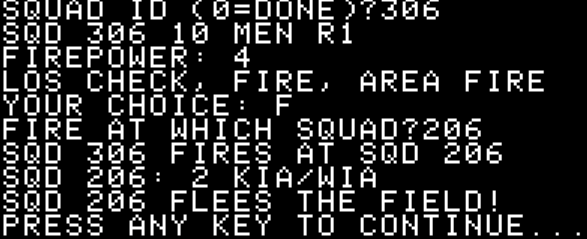
I also use my demo charges to destroy the elite squad near me, but it is not enough. I kill a few of the paras, but the rest manage to liquidate the survivors from the other melee that had just arrived for support!
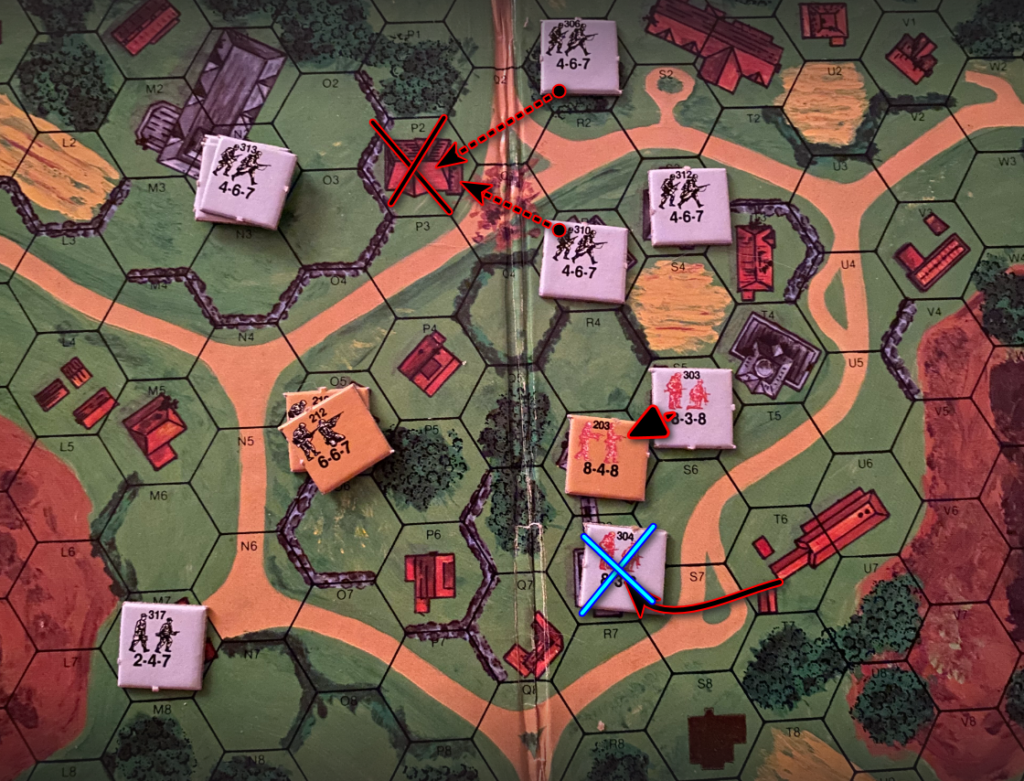
Turn 7 – Closing the battle
Not willing to risk my precious life in a random melee combat, I increase the distance between my personal squad and the paras, though the latter get eliminated the same turn anyway. The last two American squads are on the brink of collapse, and a first group flees the battlefield after minor damage. One enemy counter left.

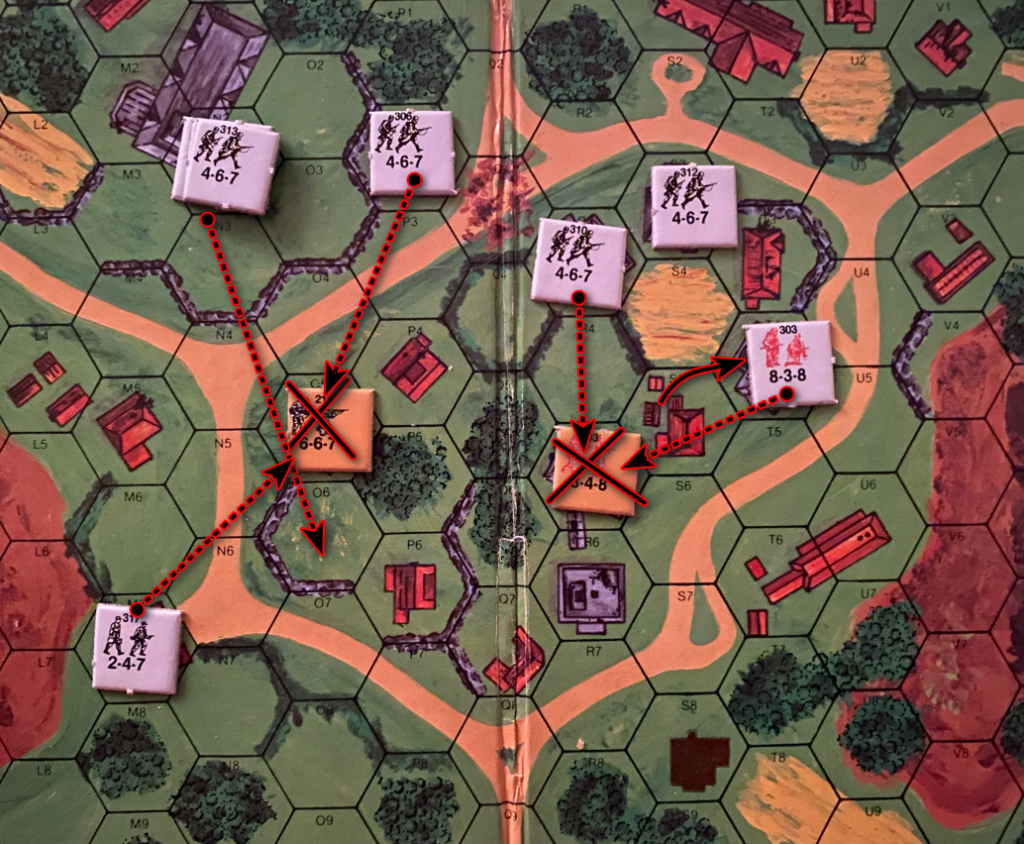
Turn 8 – The end
I launch a final assault on the last enemy counter, easily removing it from the map.
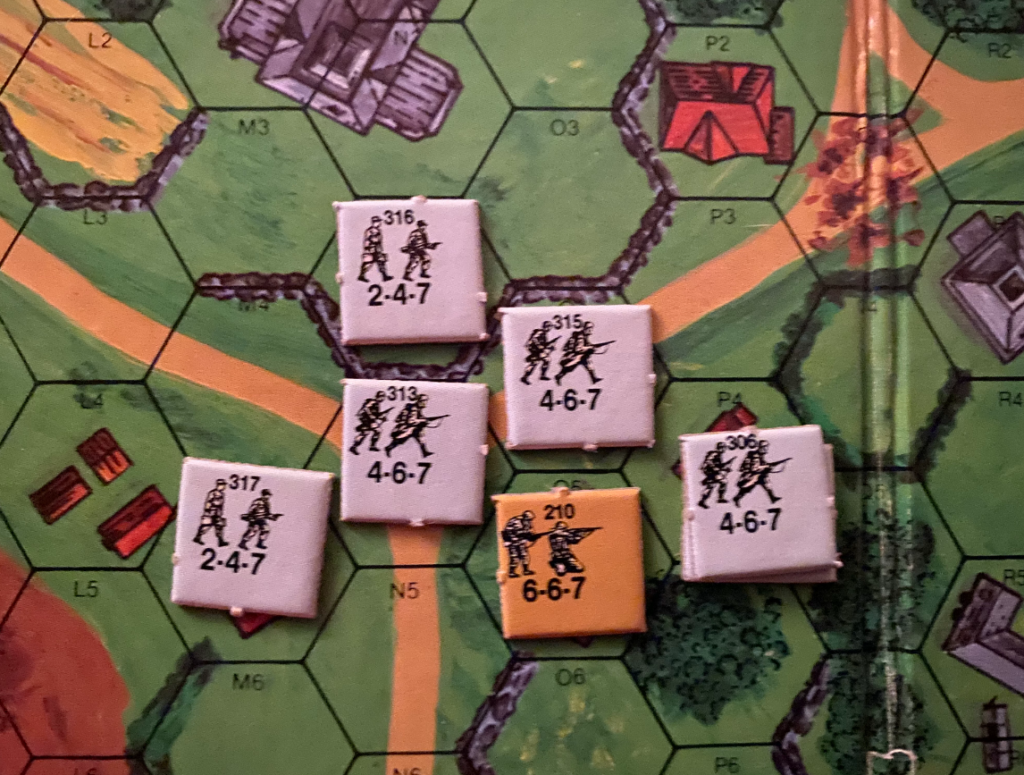
The game does not automatically end, so I have to pass two last turns before seeing the results of the battle :
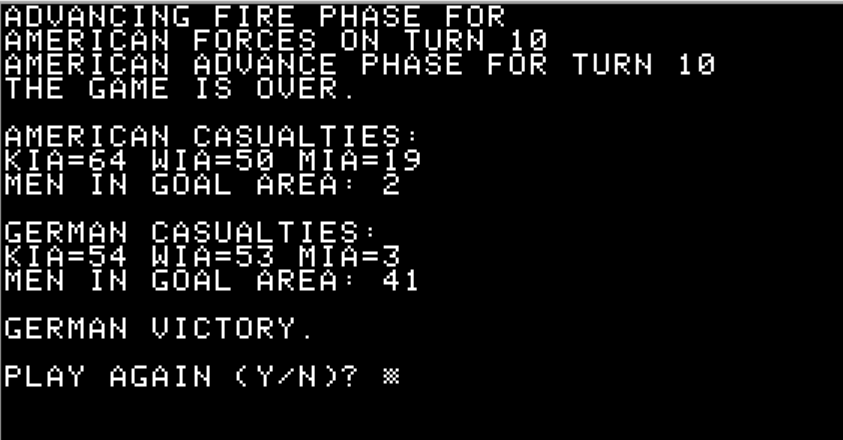
Well, I won, but that was costly: 75% of casualties (KIA, WIA or MIA), probably owing to my extremely aggressive attack that totally wiped out the Americans. The German counter-attack in the Bulge will not be able to take a lot more villages at this price, and my unit is ready to be sent to the rear for rest & rep… wait, what? Kampfgruppe for everyone and we carry on? Ah, snap!
I am a bit puzzled by the 2 GIs remaining in the area: no squad is that small to start with, and a squad that has been detected (as any damaged squad should be) remains detected until the end of the game, but well, if that’s a bug it gives some realism: probably two guys hiding in the barn waiting for the rest of the Allies to save them.
Review and rating
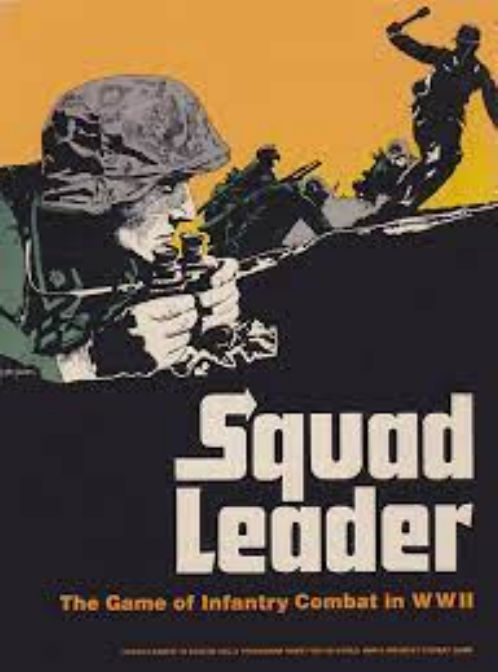
Close Assault by Gary Bedrosian, published by Avalon Hill, USA
First release: January 1983(?) on Apple II and TRS-80
Total time tested: 4 hours
Average duration of a campaign: 45 minutes
Complexity: Easy (1/5)
Would recommend to a modern player: No
Would recommend to a designer : No
Final Rating: Still interesting!
Close Assault is a computer port of Squad Leader, the popular 1977 infantry combat game that evolved into Advanced Squad Leader (“ASL”) in 1985. ASL is still today the standard of tabletop WW2 infantry combat, at least in France, and for instance, the French tabletop wargaming magazine Vae Victis still includes as I write an ASL scenario in every issue. The port is totally official, down to the point where Close Assault‘s board comes directly from one of the 4 boards of Squad Leader. As for the counters, they are a bit different and better quality than the ones in the original Squad Leader.
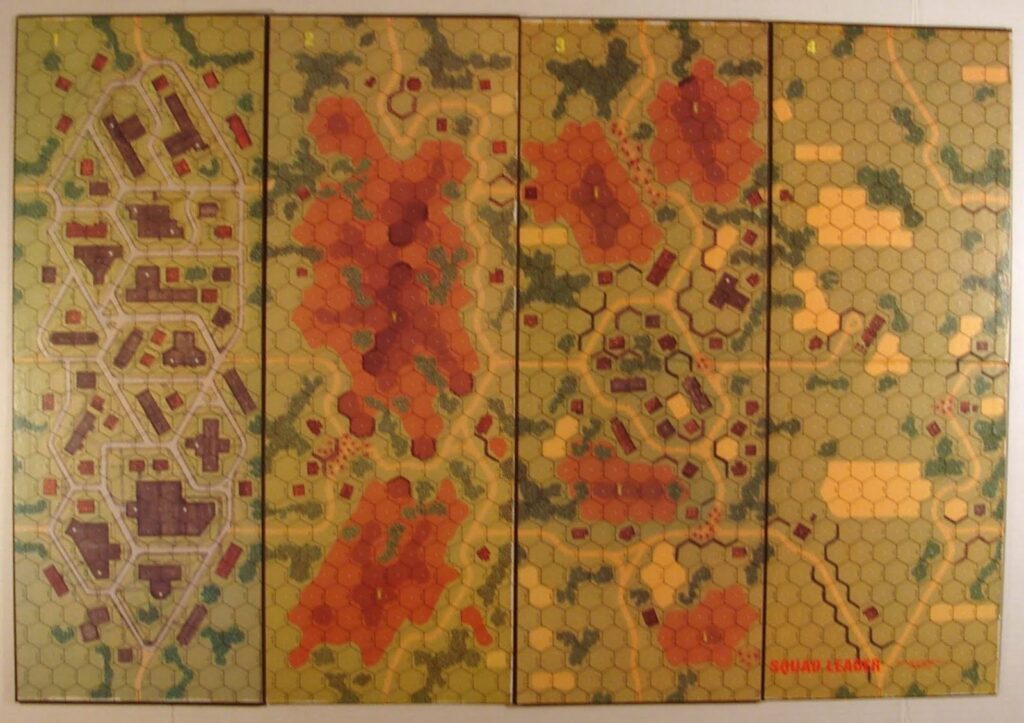
I am not familiar with the Squad Leader ruleset, happily enough Bob Proctor in Computer Gaming World (May 1983) listed the main differences :
- It is only possible in Close Combat to launch defensive fire at the end of the movement phase of the enemy, whereas in Squad Leader it was possible to shoot at the enemy on any hexagon it crossed (for instance: in the middle of the street),
- Shooting at several squads on the same hexagon dilutes firepower way more,
- Leaders only have an effect on the squad they are attached to,
- It is not possible to transfer weapons between groups,
Proctor notes that all those changes, especially the first one, tend to massively support the attacker compared to Squad Leader.
It is more a change of scope than a change of rules, but Close Assault also has a lot fewer features than Squad Leader: no vehicles, no artillery or mortar, no entrenchment and in general fewer options. In exchange, Close Assault takes into account more factors when shooting, and also tracks casualties more precisely than Squad Leader as the latter did not track individual losses in each squad.
Close Assault was developed by Gary Bedrosian, who worked on many earlier Avalon Hill games (for instance B1 Nuclear Bomber, but also Planet Miners, Empire of the Overmind, …) ; I am not sure of the exact list as Avalon Hill inconsistently credited its developers, and Gary Bedrosian did not answer any of my emails so far.
So, to the review !
A. Immersion
I like pushing counters around, so I am partial to “computer-assisted games”, and in this regard, Dniepr River Line had been a disaster, with inappropriate counter line-up compared to the needs of the game. Avalon Hill seems to have learned from its earlier mistake, and this time it really feels like playing a tabletop game against a computer : the player has all the counters they need, so the board does not need placeholders and it looks really neat overall.

The game has the right amount of difference between the factions. The Soviets (“Russians”) have weaker stats (6-2-8 for elite squads, and 4-4-7 for regular squads) and less powerful machineguns, but this is compensated by two special rules : larger squads (12 men instead of 10 for the regular) and a much higher chance for Soviet squads to turn “berserk” under stress rather than flee the battlefield. When squads become berserk, the player loses all control, and it charges forward looking for melee combat, in which it has a special “berserk” bonus. This may not be realistic – some may even say it represents an outdated view of Soviet tactics after the initial setbacks – but Squad Leader has a history of emphasizing “national traits” to create interesting challenges.
Apart from this, the ebb & flow of the game feels relatively realistic, more so than the earlier Avalon Hill games.
Rating : Good
B. UI, Clarity of rules and outcomes.
Close Assault improves massively on Dniepr River Line and is one of the first Avalon Hill games with a good UI (of course, all text !). The game pauses when there is new information that requires you to move counters, you can at any time ask for a recap of your situation and of what you know of the enemy, you can pick a unit, change your mind, and pick another unit without the first unit being considered “moved”, … The only significant issue is that the game forgets to tell you about your units performing forced movement (rout & berserk, I did not have any in my AAR) so you can discover at the worst moment that some squads are not where you expected it to be.
The manual is pretty clear, with the right balance between giving enough information, and not giving you so many information you feel you have to do math while playing. For instance, it does not tell you how to calculate chance-to-hit, but it tells you what influences chance-to-hit, ranking from the most influent to the least influent :
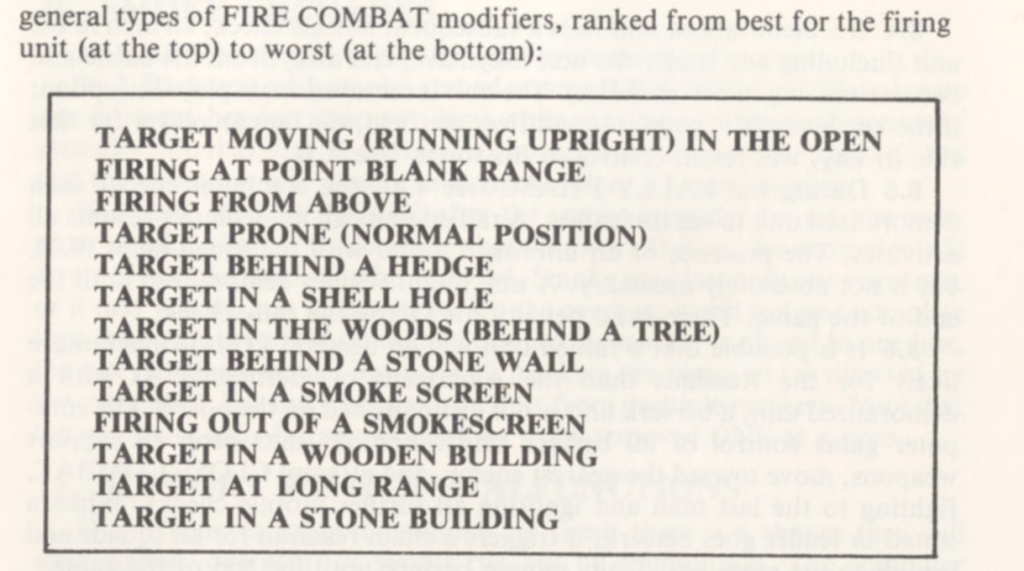
Not everything is clear in the manual. Among others, I am not sure what triggers a morale check, nor what influences the result. I have no idea of the firepower of a light machine-gun compared to a heavy one, and I have no idea what is the impact of leaders, except for morale and in melee.
I also wish I had a “chance-to-hit” displayed in game, but no other game I have covered so far had it. Some indication about which units can still move and which units have spent all their movement points would have saved some time, too.
Final minor oddities :
- There is a notepad to follow equipment and leader allocation, but it is also displayed at all times in the program, so the item is pointless,
- On the other hand, playing in multiplayer must have been frustrating with only one board, when the game features hidden movement,
Rating : Quite good
C. Systems
I believe the system is pretty clear from the AAR, though I have a few remarks :
- The way a turn works means that the safest movement is the extra “one hexagon” movement at the end of a sequence, which creates weird situations where the soldiers gather behind a building, let the enemy “defensive fire” be useless by lack of targets, then enter that building,
- There is a lot of randomness in the game :
- In combat : sometimes you miss at close range, sometimes you kill 6 guys plus the leader and destroy two machine-guns at mid-range. I am not sure how Squad Leader works, in Close Combat I suspect there is a first roll for hit-chance and another for damage rather than one roll for both,
- For morale: it did not play a large role in my AAR but units under fire or worse receiving casualties can break, in which case they either lose a lot of accuracy, or stop moving altogether, or retreat to less exposed hexagons. Units can also directly flee the battlefield, or as explained become berserk. In Close Assault, similarly to reality, some squads snap and flee after being shot at unsuccessfully once, whereas others of the exact same quality will hold the line until the bitter end.
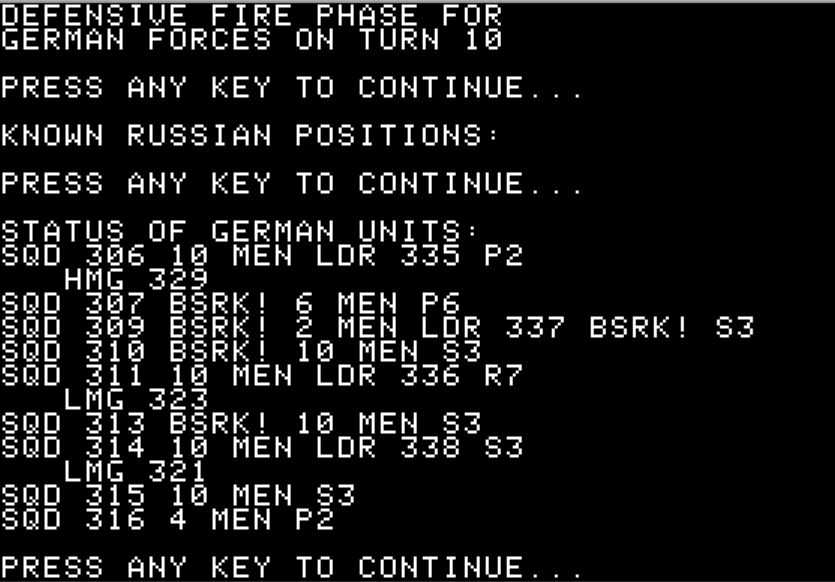
The randomness is not that bad, as there are enough units in the game to manage the occasional black swan, but it is worth knowing.
Overall, I like the system, but I would have preferred more options: vehicles, artillery, mortars, etc. With only 3 types of infantry and a handful of special weapons, it felt a bit dry after a few games.
Rating : Quite good
D. Scenario design and balancing
The AI of the game is solid, and can occasionally surprise you. The manual claims that the AI is better in attack, and well-suited for the Soviets, but what that really means is that in attack the AI exposes its squads a lot and the Soviets happen to have a bit more survivability as their squads are larger.
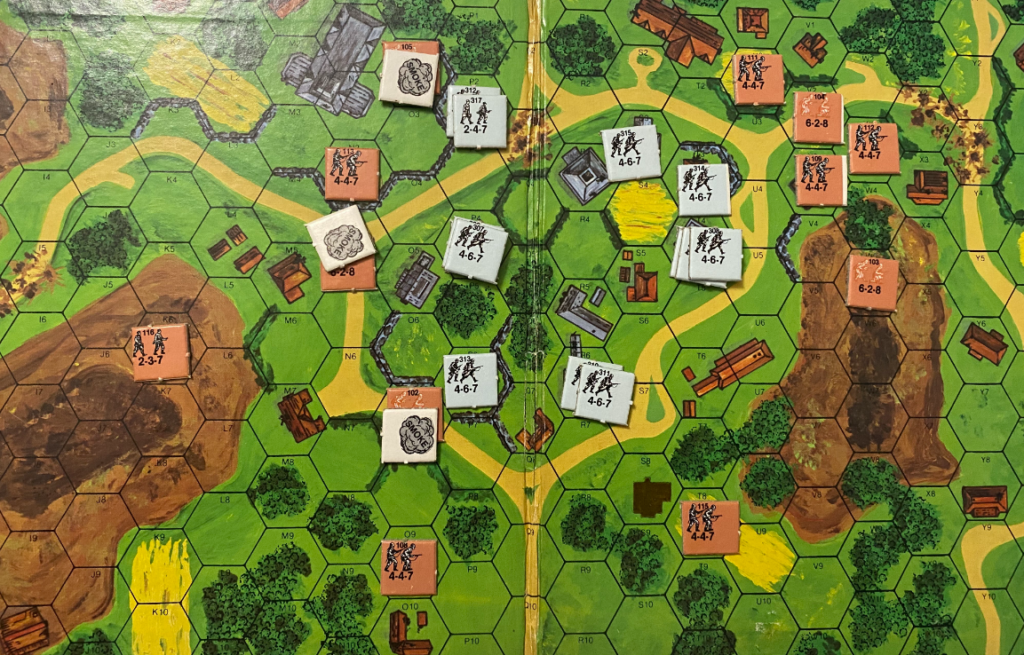
The game ships with 2 scenarios (which can be played with any combination of 2 factions) :
- Harassment of Advance opposes a diminutive defensive force and an overwhelming attacking force. The objective of the defender is to cause as much damage as possible – killing all the attackers is pretty much impossible,
- Strong Defence Point is the scenario I picked,
The game also lets you design your scenarios, but the options are very limited – you cannot even recreate the simple default scenarios with the scenario editor.
That’s where my main problem lies. I did not find the first scenario to be very engaging – I don’t want to spend one hour to inflict 20 damage rather than 10 damage to the attacking force. This leaves the second scenario and your creativity with the scenario editor. Even then, being in the defence is not really that fun against the AI : you will mostly hold your position and shoot at every opportunity. The manual claims the hardest possible combination is computer Soviets attacking and player Germans defending, but I found this combination very easy :
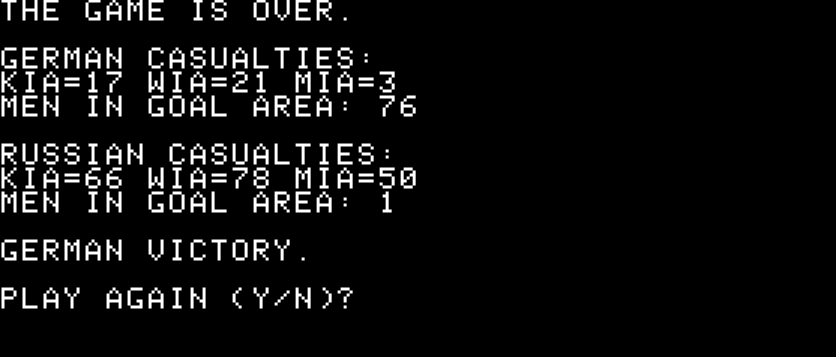
Therefore, I consider that the only interesting scenario is to be the attacker in Strong Defence Point (or a manually designed variant). The most difficult combination is probably the Germans attacking and the Americans defending.
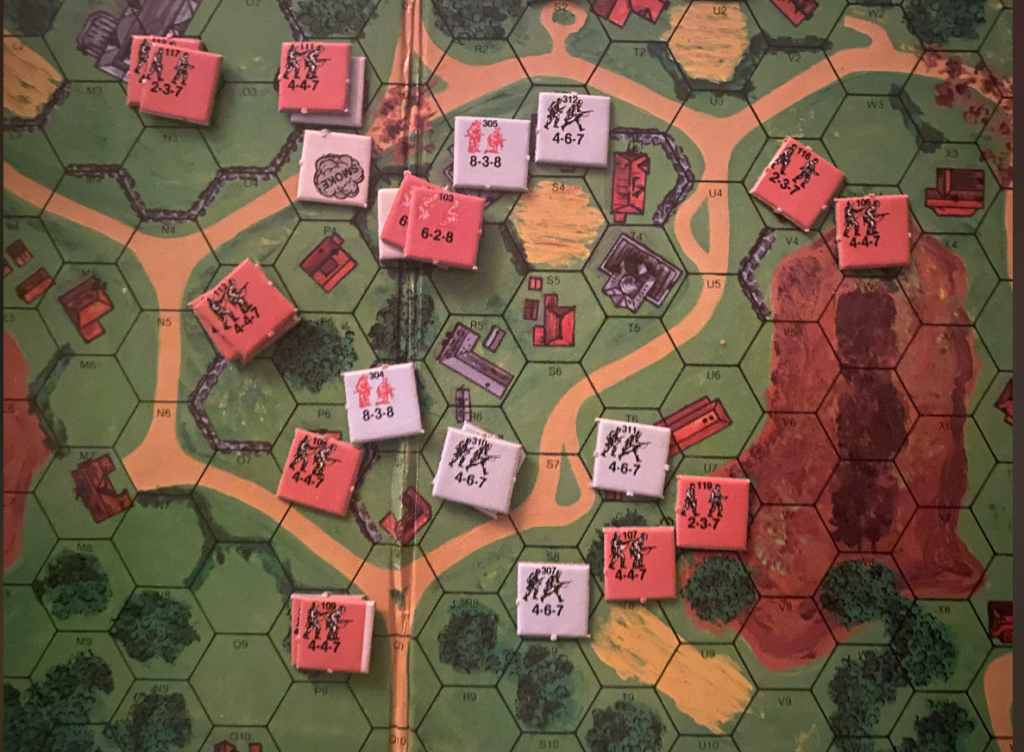
Not having a lot of interesting scenarios would not have been that bad if there had been more than one board. Sadly, while base Squad Leader had 4 different boards, which could be combined to create different battlefields, Close Assault has only one, with the objective always in the middle – except if you design a scenario otherwise. All the battles quickly look the same, especially since I don’t feel the board is well-suited for what the game has to offer (eg a range advantage is rarely useful given that most of the action happens in the village surrounded by hills). A second board with maybe less cover would have gone a long way.
Rating: Very poor
E. Did I make interesting decisions?
Yes, though less and less as the battle rages on and actions become more and more obvious.
F. Final rating
Still interesting ! Easy to play, and inheriting most of the solid Squad Leader system, Close Assault has been somewhat protected from graphical obsolescence by not having graphics in the first place – boards and counters definitely don’t age that much – which also means you need the board to enjoy this! Replayability is low though, and after a few entertaining sessions the game is bound to be shelved.
Contemporary Reviews
As expected, Close Assault was reviewed in Computer Gaming World in May 1983. Bob Proctor warns “It is inevitable that close Assault will be compared to Avalon Hill’s Squad Leader […] It is only fair to warn Squad Leaders fans, though, that if they buy Close Assault hoping to have a computer Squad Leader opponent they will be disappointed”. As I mentioned earlier, Proctor then lists the differences between the two games – the one he seems to like the most is the rule about not dying on the battlefield if you don’t want the AI to command in your stead. Finally, Proctor claims that he prefered Legionnaire but still Close Assault is the best Avalon Hill game for Apple and TRS-80.
Strangely, I could not find many other reviews, though the few I could find were positive. The most significant example comes from SoftTalk in August 1983 : “Close Assault represents a refreshing change in computer wargaming. [It is] a first-rate entry into the war game arena.” Possibly, “computer-assisted wargames” were seen as something of the past already. Despite Bob Proctor’s praise, Robert Evans totally ignored the game in his first May 1987 article in CGW listing all the WW2 wargames, and only recalled it in 1991 to state the game is “awkward, clumsy and obsolete.” I am much less negative, and I am looking forward to playing the early Simulations Canada computer-assisted wargames, provided I find them, which is sadly far from guaranteed.
On an unrelated topic I found The Alien to be a perfect game for an interactive Commenters Command. We are still missing a few players so join up.